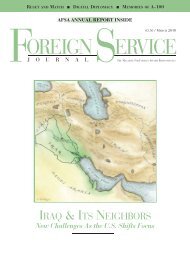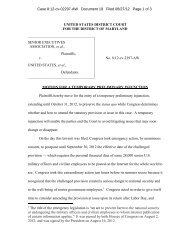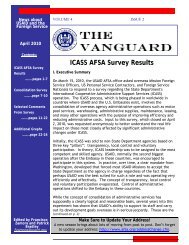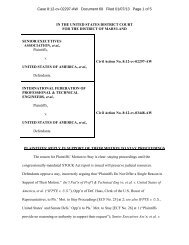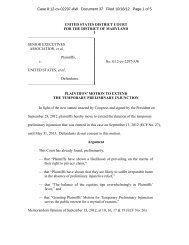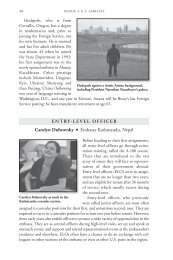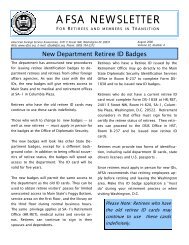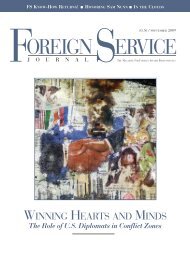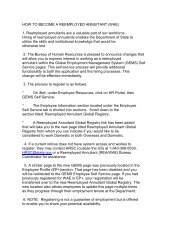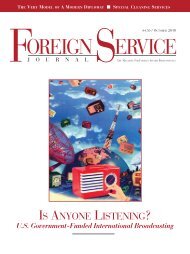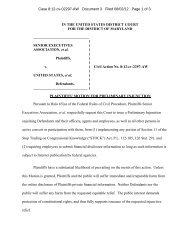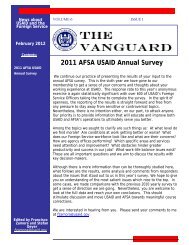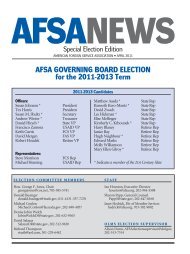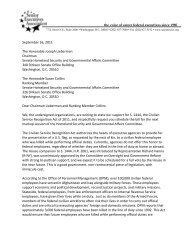F OCUS - American Foreign Service Association
F OCUS - American Foreign Service Association
F OCUS - American Foreign Service Association
Create successful ePaper yourself
Turn your PDF publications into a flip-book with our unique Google optimized e-Paper software.
WHEN AN FS SPOUSE<br />
COMES “HOME”: A STUDY<br />
RE-ENTRY TO THE U.S. AFTER LIVING OVERSEAS INVOLVES ADJUSTMENTS<br />
THAT ARE NOT ALWAYS EASY. THIS STUDY IDENTIFIES SOME OF THE FAULT LINES<br />
BETWEEN SUCCESS AND FAILURE.<br />
BY SHARON MAYBARDUK<br />
Iremember being a young <strong>Foreign</strong> <strong>Service</strong> spouse<br />
new to Washington, D.C., driving an old rented car<br />
on a blustery winter’s day. Lost in a city I did not<br />
know, I tried to soothe a 3-year-old who was pleading,<br />
“Mommy, I want to go home.” Home, I<br />
thought; that’s what we’re trying to find. But home<br />
was hundreds of miles away in a sun-drenched paradise<br />
that nobody here seemed to care about. I felt very<br />
alone.<br />
I did not understand it then, but I was going through a difficult,<br />
but normal, process of re-entry. The return to the U.S.<br />
on reassignment for a period of one year or longer after living<br />
and working overseas is part of the <strong>Foreign</strong> <strong>Service</strong><br />
lifestyle. Fifty years of published research among non-State<br />
Department populations has shown that re-entry problems<br />
— difficulties readjusting to one’s home culture after living<br />
abroad for an extended period of time — are shared by many<br />
sojourners across occupational groups and cultures. These<br />
can range from a mild sense of not fitting into the home environment<br />
to more serious and longer-lasting emotional difficulties<br />
that may require outside professional help.<br />
Previous academic research on re-entry, primarily in the<br />
Sharon Maybarduk is a 2008 graduate of the Smith College<br />
School for Social Work, specializing in family therapy. She<br />
has been a <strong>Foreign</strong> <strong>Service</strong> spouse for 33 years, accompanying<br />
her husband, Gary Maybarduk, to Papua New Guinea,<br />
Mexico, Nicaragua, Sierra Leone, Cuba and Venezuela.<br />
This article is based on her master’s thesis, “An Exploration<br />
of Factors Associated with Re-Entry Adjustment of <strong>Foreign</strong><br />
<strong>Service</strong> Spouses.”<br />
fields of education and psychology, has been conducted<br />
mainly on individuals assigned overseas as business managers,<br />
volunteers, teachers or students. But there has been little<br />
research on accompanying spouses. This fact inspired my<br />
own effort to identify factors associated with the re-entry adjustment<br />
of <strong>Foreign</strong> <strong>Service</strong> spouses, as representative of a<br />
population of accompanying spouses.<br />
The Study of Culture Shock<br />
Historically, an understanding of re-entry adjustment rose<br />
out of the study of culture shock — the problems of adapting<br />
to life in a foreign culture — after World War II, when government-sponsored<br />
international exchange programs came<br />
into prominence. In 1955, a long-term study of Norwegian<br />
Fulbright scholars who taught and studied in the U.S. found<br />
that not only did the scholars suffer from culture shock in adjusting<br />
to life in the U.S. but, quite unexpectedly, they also<br />
exhibited problems readjusting to their home culture upon<br />
return. This phenomenon of re-entry was referred to as “reverse<br />
culture shock.”<br />
With further study, distinctions between culture shock and<br />
reverse culture shock began to appear. Though both phenomena<br />
are reactions to cultural change and both represent<br />
stages of accommodation to this change, some aspects of reverse<br />
culture shock appeared fundamentally different. Those<br />
differences, first posited in 1981 by Nancy J. Adler, a professor<br />
of organizational behavior at McGill University, have to<br />
do with expectations.<br />
Sojourners returning home to their native culture do not<br />
expect anything to be unfamiliar, though they had such expectations<br />
of the foreign culture when they went overseas.<br />
A P R I L 2 0 0 9 / F O R E I G N S E R V I C E J O U R N A L 33



